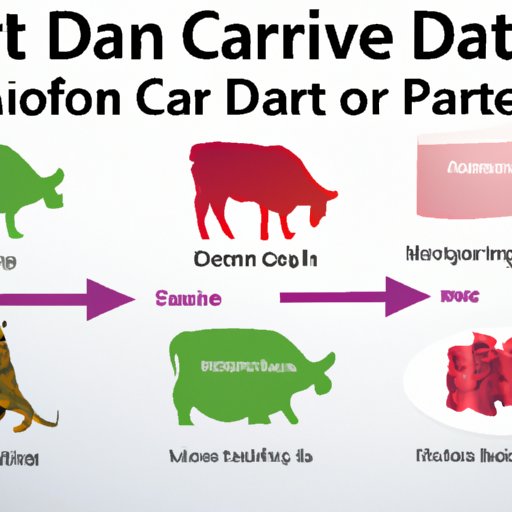Introduction
The carnivore diet has become increasingly popular in recent years, with many people turning to this all-meat diet as a way to lose weight, improve their health, and even treat chronic illnesses. But what is the carnivore diet? Is it safe? This article will explore the potential benefits and risks of following a carnivore diet and examine the science behind it.
Examining the Science Behind the Carnivore Diet: Is it Safe?
The carnivore diet is an extreme version of the ketogenic diet, which involves eating a high-fat, low-carbohydrate diet. On the carnivore diet, followers eat only animal products such as beef, pork, poultry, fish, and eggs. Dairy, fruits, vegetables, grains, legumes, nuts, and seeds are all off-limits. This type of diet has been around for centuries and has been used by some cultures as a way to heal various ailments.
While there are some potential benefits to following a carnivore diet, there are also some risks to consider. One of the biggest concerns is the potential for nutritional deficiencies due to the lack of variety in the diet. A diet that consists only of animal products lacks some essential nutrients, including fiber, vitamins, and minerals. Without these important nutrients, the body may struggle to function properly.
In addition, there are some potential negative effects on health that have been associated with the carnivore diet. Studies have found that a diet high in animal proteins has been linked to an increased risk of certain cancers and heart disease. Additionally, a diet that consists solely of animal products can lead to an unhealthy level of cholesterol, which can increase the risk of stroke and heart attack.

Pros and Cons of Eating a Carnivore Diet
The carnivore diet has both pros and cons. Here are some of the potential benefits of following a carnivore diet:
Pros
- Weight Loss: The carnivore diet is a great way to lose weight quickly. By eliminating carbohydrates from the diet, followers are able to reduce their calorie intake and shed pounds quickly.
- Increased Energy: Many people report having more energy when following a carnivore diet. This is likely due to the elimination of processed foods and sugars from the diet.
- Improved Digestion: Eating only animal products can help improve digestion by reducing bloating and constipation.
Cons
- Lack of Variety: Eating only animal products can get boring over time. This can make it difficult to stick to the diet in the long term.
- Risk of Nutrient Deficiencies: As mentioned above, following a carnivore diet can lead to nutrient deficiencies due to the lack of variety in the diet.
- Risk of Excess Protein Intake: Eating too much protein can cause kidney problems and other health issues.

Exploring the Health Benefits of Eating Only Meat
Despite the potential risks, there are some health benefits to eating only animal products. Here are some of the potential benefits of eating only meat:
Protein
Meat is a great source of protein, which is essential for building muscle, repairing tissue, and maintaining a healthy immune system. Eating only animal products ensures that you are getting enough protein in your diet.
Fat
Animal products are a great source of healthy fats, which are important for maintaining brain health, keeping skin and hair healthy, and providing energy. Fats also help you feel fuller longer, which can help with weight loss.
Vitamins and Minerals
Animal products are also a good source of vitamins and minerals, such as iron, zinc, and B vitamins. These essential nutrients are important for maintaining overall health and preventing diseases.
An Overview of the Carnivore Diet and its Potential Risks
Although there are some potential benefits to following a carnivore diet, there are also some risks to consider. Here are some of the potential short-term and long-term side effects of eating only animal products:
Short-Term Side Effects
- Headaches
- Fatigue
- Nausea
- Constipation
Long-Term Health Concerns
- Kidney damage
- High cholesterol
- Osteoporosis
- Certain cancers
It’s important to note that these potential risks are not definitive and may vary from person to person. Additionally, the risks associated with the carnivore diet may be minimized by eating a variety of animal products and limiting the amount of red meat consumed.
What You Need to Know About the Carnivore Diet: Is it Safe?
When considering whether the carnivore diet is safe, it’s important to remember that moderation is key. The diet should be followed in moderation, and individuals should ensure they are getting all the essential nutrients they need. Additionally, the diet may not be suitable for everyone. People with certain medical conditions, such as diabetes or kidney disease, should consult with their doctor before starting any new diet.
It’s also important to seek professional advice if you are considering following a carnivore diet. A registered dietitian can provide individualized advice on how to safely follow the diet and ensure you are getting all the essential nutrients your body needs.
Conclusion
The carnivore diet is an extreme version of the ketogenic diet that involves eating only animal products. While there are some potential benefits to following a carnivore diet, such as weight loss and increased energy, there are also some risks to consider. These include the potential for nutritional deficiencies, an increased risk of certain diseases, and the risk of excess protein intake.
It’s important to remember that moderation is key when it comes to the carnivore diet. Individuals should ensure they are getting all the essential nutrients they need and seek professional advice if necessary. Ultimately, the decision to follow a carnivore diet should be based on an individual’s personal health goals and lifestyle.
(Note: Is this article not meeting your expectations? Do you have knowledge or insights to share? Unlock new opportunities and expand your reach by joining our authors team. Click Registration to join us and share your expertise with our readers.)
